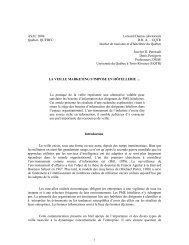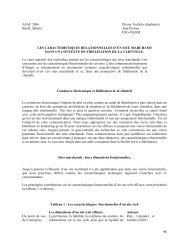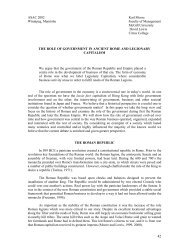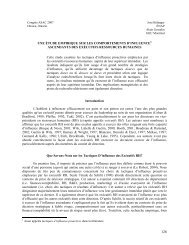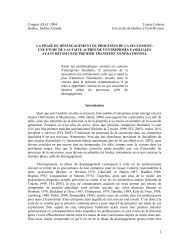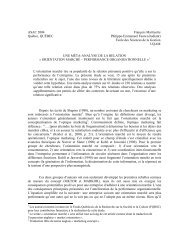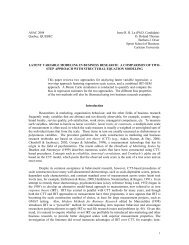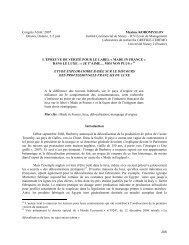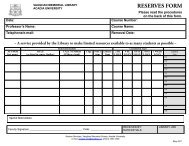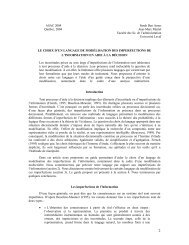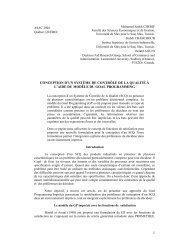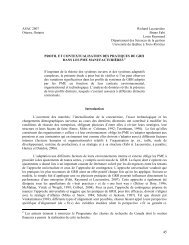ASAC 2004 – Quebec City Lynne Gillis – St. Francis Xavier ...
ASAC 2004 – Quebec City Lynne Gillis – St. Francis Xavier ...
ASAC 2004 – Quebec City Lynne Gillis – St. Francis Xavier ...
Create successful ePaper yourself
Turn your PDF publications into a flip-book with our unique Google optimized e-Paper software.
“They’ll sponsor events and help finance things <strong>–</strong> dinners and meetings. I think<br />
it works both ways. I think it would be unreasonable to expect them to fund<br />
some event we wanted and not allow them to have at least a sales pitch.”<br />
The physicians were quick to recognize the concept of reciprocity and how it plays into the<br />
relationship between physicians and PSRs. A majority of physicians stated one of their<br />
motivations in meeting with PSRs was because they would sponsor CME events. While<br />
physicians did not explicitly state that a type of ‘creditor ideology’ existed between themselves<br />
and sales representatives, they indicated would spend longer periods or meet more frequently<br />
with PSRs who provided them such things as more samples, CME events or luncheons. The rule<br />
of reciprocity appears to apply to the PSR and physician relationship (Cialdini, 1988; Carlson et<br />
al., 2000; Gouldner, 1960). Physicians are willing to provide their time in sales meetings with<br />
PSRs at least in part for the returns sales representatives bring, such as free product samples and<br />
arranging CME events.<br />
It is important to note one physician did appear to exhibit a form of reciprocation wariness in<br />
relationships with sales representatives. The physician appeared to be suspicious as to the<br />
motive behind the ‘gift’ (Eisenberger et al., 1988) sales representatives brought, such as CME<br />
events and promotional luncheons. While, one physician also directly commented on the debate<br />
about whether these types of gifts would cause a physician to change their prescribing patterns.<br />
The physician argued that this ‘bribing’ for prescriptions to be written, through such things as<br />
promotional dinners, was overdone and exaggerated (c.f. Raton & Ross, 2002).<br />
“There are a lot of studies done by members in the medical community out there<br />
that say that physicians are influenced by what they are given but I feel that’s<br />
patronizing and a put-down. To get to medical school you have to be intelligent<br />
and well-educated; general practitioners especially have to be people persons and<br />
I feel so you get pretty good at feeling out who a person is and what they’re<br />
saying. In other words I say give us some credit for our intelligence here. We’re<br />
quite free to listen and discard information . . . I am insulted to a certain extent by<br />
my own peers telling me this is how I’ll react to salesmen.”<br />
However as Orlowski and Wateska (1992) found, physicians are not immune to the concept of<br />
reciprocity. The authors tracked the usage reports of 2 drugs in local pharmacies after 20<br />
physicians were sponsored to attend continuing medical education seminars sponsored by the<br />
companies producing the drugs. After the seminars, usage of the drugs described increased<br />
compared to their previous prescriptions and also compared to the national average during the<br />
same period. Most compelling of their findings was that all but one physician denied that the<br />
seminars influenced their behavior.<br />
Weapon 4: Likeability<br />
“You build friendships with most drug reps and most of them are pretty nice<br />
people actually . . .”<br />
Consumers have been found more likely to respond favorably to salespeople we know or like<br />
(Cialdini, 1988). Ten of the 11 physicians mentioned that they had a friendly social relationship<br />
with at least a few PSRs. The physician who did not generally meet with PSRs mentioned that<br />
the motivation to meet particular representatives was for social interaction rather than product<br />
detailing. Three physicians mentioned they would be willing to meet with those PSRs they had a<br />
social and/or long-term relationship with in situations where they would not otherwise meet<br />
representatives due to time conflicts, among other reasons. The lengths of these meetings were<br />
not necessarily longer due to a longer discussion of the sales representatives’ product; part of the<br />
6




